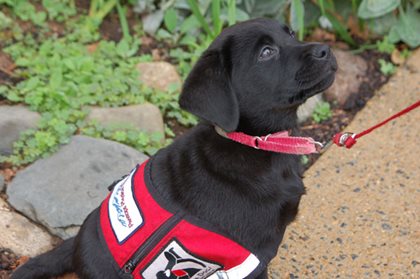Thursday January 26, 2017
 For individuals with disabilities, having the assistance and companionship of a service dog can help them achieve a greater quality of life and assist in performing daily tasks. What happens if conflicts arise due to your New York City condominium’s or cooperative’s policies and your need for a service animal? If a service animal is employed as outlined by the Americans with Disabilities Act (ADA), your condo or co-op cannot prohibit it. Aside from compliance with ADA regulations and access to public spaces, the presence of a service animal can raise important questions when considering fairness to other residents and their guests. It is critical that your condo or co-op remain compliant with the ADA while aspiring to avoid any situations which may limit the rights and privileges of any individuals who are acting within their rights. As this is both a sensitive and relevant situation that many condos and co-ops can face, the following guidelines are intended to guide you and your board in clarifying information about service animals and the rights of individuals with disabilities in your community.
For individuals with disabilities, having the assistance and companionship of a service dog can help them achieve a greater quality of life and assist in performing daily tasks. What happens if conflicts arise due to your New York City condominium’s or cooperative’s policies and your need for a service animal? If a service animal is employed as outlined by the Americans with Disabilities Act (ADA), your condo or co-op cannot prohibit it. Aside from compliance with ADA regulations and access to public spaces, the presence of a service animal can raise important questions when considering fairness to other residents and their guests. It is critical that your condo or co-op remain compliant with the ADA while aspiring to avoid any situations which may limit the rights and privileges of any individuals who are acting within their rights. As this is both a sensitive and relevant situation that many condos and co-ops can face, the following guidelines are intended to guide you and your board in clarifying information about service animals and the rights of individuals with disabilities in your community.
-
A clear designation
According to the ADA, only dogs can be designated as service animals. The dog must also be trained to perform specific tasks to assist its owner. Examples of such assistive tasks include canines that assist the blind, provide alert functions for those who are deaf, pull wheelchairs, remind people when to take their medication and calm those diagnosed with post-traumatic stress disorder. The critical distinction is that these animals serve essential functions for the humans they are employed by, and are not there to act as household pets. By the ADA’s definition, animals who are employed to strictly provide comfort or emotional support do not fulfill the requirements of service animals. If your condo or co-op prohibits pets, your board may not be obligated to accommodate animals who serve in an emotional support role.
-
Know your do’s and don’ts
If you reside in a pet-prohibited community, you may be inclined to question the presence of a dog on the property. If the dog’s purpose isn’t obvious, there are only two questions you can ask:
1) Is the dog a service animal required for a disability?
2) What work or task does the dog perform?
Take note that it is a violation of the ADA to ask about any individual’s specific disability, or to require any formal medical documentation to justify the animal’s presence. NEVER ask for any demonstration of the dog’s capabilities or proof of its training. The ADA requires that animals be trained, but that training can be conducted by the owners themselves.
-
Requesting removal of an animal (limited circumstances only!)
ADA guidelines stipulate that a service dog must be leashed, tethered or under strict verbal command at all times. If the dog’s handler fails to meet these requirements, removal of the service dog may be considered. If the dog is not housebroken, you are not obligated to accommodate it either.
-
Waive the fees
It is prohibited to charge fees for a service animal, regardless of your building’s pet policy. Owners of service animals cannot be charged any additional fees that are not charged to people without pets. Remember, under ADA rules, a service animal cannot be, and should not be, classified as a pet.
-
Required documentation
As mentioned above, it is prohibited by the ADA to ask a disabled person for documentation which proves that their dog is a service animal. However, many states require licenses and registration for service animals, and it is within your rights to ask for the appropriate documentation. ADA compliance can be difficult, but following the information above will help to alleviate any issues related to service animals.